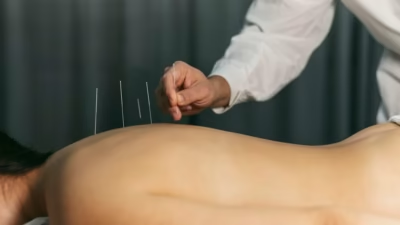Your jaw has a special joint called the TMJ. It helps you talk, chew, and yawn. TMJ stands for temporomandibular joint. It connects your jaw to the bones near your ears. When this joint gets hurt or stressed, it can cause pain.
Sometimes, this pain spreads to your neck. That’s called TMJ neck pain. It feels like a tight or sore neck, even though the problem starts in your jaw.
Many people ask, “Can TMJ cause neck pain?” The answer is yes. TMJ problems can lead to headaches, sore jaws, and neck aches too. You’re not alone—this happens to lots of people!
Let’s learn why this happens, how it feels, and what you can do to feel better.
Anatomy of the Temporomandibular Joint and Neck
Your TMJ is a small joint that works like a door hinge. It connects your lower jaw (called the mandible) to the side of your head, right in front of your ears. You have one TMJ on each side of your face. These joints help you chew, talk, and yawn.
But the TMJ doesn’t work alone. It’s connected to many muscles. These muscles reach from your jaw down to your neck and even your upper back. That means when something is wrong with your TMJ, the pain can spread to your neck.
The prevalence of temporomandibular joint and muscle disorder (TMJD) is between 5% and 12%. This highlights how common TMJ issues are and how they can affect the neck.
Your neck has bones called the spine. These bones support your head and let it move. The muscles around your TMJ and neck help hold your head up straight. If your jaw muscles get tight or tired, they can pull on your neck muscles too. This causes TMJ and neck pain.
Even your posture matters. If you sit or stand the wrong way, it can stress your jaw and neck together. That’s why your jaw and neck are like teammates—they have to work together. When one gets hurt, the other feels it too.
Now that you know how they’re connected, let’s look at how TMJ can actually cause neck pain.
How TMJ Can Cause Neck Pain

Have you ever had a sore jaw after chewing gum too long? That’s your TMJ working hard. But sometimes, the TMJ can get hurt or stressed. When that happens, the muscles around it get tight. These muscles are connected to your neck too.
So, can TMJ cause neck pain? Yes, it can! When your jaw muscles feel tired or tense, they can pull on your neck muscles. That can lead to a sore neck, stiff shoulders, or even headaches.
Also, there are nerves in your jaw that send signals to your brain. These nerves are close to the nerves in your neck. If the jaw nerves get irritated, they can make your neck hurt too.
Evidence suggests that TMD (temporomandibular dysfunction) are commonly associated with other conditions of the head and neck region, including cervical spine disorders and headache. The presence of neck pain was shown to be associated with TMD 70% of the time. This shows that TMJ and neck pain often go hand in hand.
You might wonder, “Does TMJ cause neck pain even if my jaw feels fine?” Yes! Sometimes the pain shows up in the neck first. That’s because everything in your head, jaw, and neck is connected like puzzle pieces.
Even grinding your teeth or clenching your jaw can create tension. That pressure travels down to the neck. It’s like pulling a string on one end and seeing the other end move too.
TMJ problems don’t just stay in the jaw—they travel. And one of the most common places they go is your neck.
Causes of TMJ and Neck Pain
The study concluded that office workers with self-reported neck pain showed a higher prevalence of TMD symptoms. There exists a significant positive association between temporomandibular dysfunction and mechanical neck pain. This study shows how neck pain and TMJ can be related, especially in people who sit for long hours.
There are many things that can cause TMJ and neck pain. Some are simple habits, and some happen without us knowing. Let’s look at the most common causes:
1. Teeth Grinding and Clenching: Some people grind or clench their teeth, especially when they’re sleeping or feeling stressed. This puts a lot of pressure on the TMJ. Over time, the jaw muscles get tired, and that pressure can spread to your neck.
2. Poor Posture: When you sit with your head forward or slouch for a long time, your neck and jaw have to work harder. This bad posture can lead to TMJ neck pain. Looking down at phones and screens too much can also be a problem.
3. Stress: When you’re worried or upset, you might tighten your jaw without even knowing it. This can make the jaw and neck muscles feel tight and sore.
4. Injury: A bump to your face, head, or neck can hurt the jaw joint. Even a small injury can lead to pain later.
5. Sleep Habits: Sleeping on your stomach or with your neck bent can also strain your jaw and neck muscles.
Many small things can cause TMJ and neck pain. The good news? Most of them can be fixed or helped with the right care.
Symptoms and Location of TMJ Neck Pain
TMJ neck pain can feel different for everyone. But there are some common signs you can look out for.
You may feel a sore or tight jaw, especially near your ears. Sometimes your jaw may even click or make a popping sound when you open your mouth.
The pain doesn’t stay in your jaw—it often travels to your neck, shoulders, or even your head. You might feel a stiff neck that’s hard to turn, or your shoulders may feel tight like you’ve been carrying a heavy backpack.
Some kids even say their ears hurt or feel full, even though there’s no ear infection. That’s because the TMJ is close to your ears.
TMJ neck pain can also cause headaches, especially near your temples or the back of your head.
If you notice these symptoms happening a lot, it could be your TMJ causing trouble in your neck too. Listening to your body helps you know when something isn’t quite right.
How to Treat TMJ Neck Pain

If you’re feeling TMJ neck pain, don’t worry—there are many ways to help! Some you can do at home, and others need help from a doctor. Treating the pain early can stop it from getting worse.
Let’s look at some easy and helpful treatments:
Ice and Heat Therapy
Using ice can help reduce swelling and numb the pain. Heat helps relax tight jaw and neck muscles. Try placing a warm towel or ice pack on your jaw or neck for 10–15 minutes. Do it a few times a day for relief.
Gentle Exercise
Simple jaw and neck stretches can help loosen stiff muscles. Slowly open and close your mouth. Gently turn your head side to side. These light exercises can make your jaw and neck feel better over time. Be careful not to push too hard.
Over-the-counter Pain Medications
Medicines like ibuprofen or acetaminophen can help lower pain and swelling. These are easy to get at the store. But always ask a parent or doctor before taking medicine. They are good for short-term relief of TMJ neck pain.
Physical Therapy
A physical therapist can teach you how to move your jaw and neck the right way. They show you stretches and exercises that help your muscles feel better. They also help fix posture and teach breathing tricks to reduce stress. Therapy takes time, but it really works.
Botox
Botox isn’t just for wrinkles! It can be used by doctors to relax very tight jaw muscles. A small shot goes into the muscle. It helps stop clenching and grinding, which can reduce TMJ neck pain. This is usually for people who don’t feel better with other treatments.
Surgery
Surgery is a last option. Most kids and adults don’t need it. But if your jaw joint is really damaged or out of place, a doctor might suggest it. Surgery can help fix how your jaw moves. It’s only used when nothing else works.
Prevention and Self-Care Tips to Avoid TMJ Neck Pain
You can stop TMJ and neck pain before it starts! There are a lot of things you can do at home to keep your jaw and neck healthy. By practicing some simple habits, you’ll help your muscles stay relaxed and pain-free.
Let’s take a look at some helpful tips:
Proper Posture
Keeping good posture is super important for your jaw and neck. When you sit or stand, try to keep your back straight, your shoulders back, and your head up. This will help prevent neck strain and keep your jaw in a good position. Avoid slouching or looking down for too long.
Jaw Exercises and Stretches
Doing simple jaw exercises can keep your jaw muscles strong and flexible. Try opening your mouth slowly and closing it gently, or move your jaw side to side. These exercises help prevent stiffness and TMJ neck pain. It’s important to do these exercises every day for the best results.
Mouthguard
A mouthguard can help protect your jaw while you sleep. If you grind your teeth at night, a mouthguard can stop that. It fits over your teeth and keeps your jaw in a better position, helping reduce neck discomfort. It’s easy to get one from a dentist.
Reducing Stress
When you’re stressed, you might clench your jaw or grind your teeth without realizing it. Stress can make your jaw and neck muscles tight and sore. Try relaxing activities like deep breathing, yoga, or listening to calm music. Reducing stress can keep your jaw muscles from becoming tense and help prevent TMJ neck pain.
When to Seek Professional Help
If TMJ neck pain doesn’t get better or keeps coming back, it’s time to see a doctor. Some TMJ and neck pain can be treated at home, but if the pain is strong, lasts a long time, or gets worse, it’s important to get help.
Signs that TMJ and Neck Pain Requires Medical Attention
If you feel severe pain in your jaw or neck that doesn’t go away, it’s a sign you might need to see a doctor. If your jaw gets stuck or you can’t open your mouth fully, or if you have sharp headaches, those are also signs to seek help. Numbness or tingling around your face, neck, or shoulders is another reason to get checked by a doctor.
Types of Specialists to Consult
If your TMJ neck pain is not getting better, you may need to see a few types of doctors. A dentist can check your jaw health, while a physical therapist can help with muscle exercises. Sometimes, you may need a pain specialist or an oral surgeon if the pain is very strong or requires surgery.
Conclusion
TMJ neck pain can happen when your jaw and neck muscles aren’t working well together. It can be caused by things like teeth grinding, bad posture, or stress. The pain usually shows up in your jaw, neck, or even your head. To treat it, you can try ice or heat therapy, gentle exercises, and over-the-counter medicine. To keep pain away, remember to sit up straight, do jaw stretches, and try to reduce stress. If the pain keeps coming back or is really bad, it’s important to see a doctor for help.
FAQs
Can TMJ Problems Cause Neck Pain?
Yes, TMJ problems can cause neck pain. When your jaw muscles are tight or out of place, it can affect the muscles in your neck. This can lead to soreness and discomfort in the neck area. So, TMJ and neck pain often go together.
How Do You Get Rid of TMJ Neck Pain?
To get rid of TMJ neck pain, try ice or heat therapy, doing jaw exercises, or taking over-the-counter pain medicine. You can also see a physical therapist to help with exercises and stretches. If the pain doesn’t go away, a doctor may suggest other treatments like Botox or surgery.
How Long Does TMJ Neck Pain Last?
The length of TMJ neck pain can be different for everyone. It can last for a few days or weeks, depending on the cause. If you take steps to relax your jaw muscles and treat the pain early, it can help shorten how long it lasts. If the pain continues, see a doctor for help.
James Foster, PT is a licensed physical therapist with over 11 years of hands-on experience in helping individuals improve mobility and live pain-free. As a health writer, James shares expert advice, rehabilitation strategies, and wellness tips to empower readers toward healthier, stronger lives.


